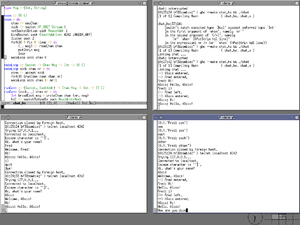Implement a chat server: Difference between revisions
m (init/id) |
|||
| Line 164: | Line 164: | ||
hSetBuffering hdl NoBuffering | hSetBuffering hdl NoBuffering | ||
hPutStrLn hdl "Hi, what's your name?" | hPutStrLn hdl "Hi, what's your name?" | ||
name <- liftM init (hGetLine hdl) | name <- liftM init (hGetLine hdl) | ||
broadcast ("--> " ++ name ++ " entered.") | broadcast ("--> " ++ name ++ " entered.") | ||
hPutStrLn hdl ("Welcome, " ++ name ++ "!") | hPutStrLn hdl ("Welcome, " ++ name ++ "!") | ||
Revision as of 18:48, 2 November 2011
Introduction
This page describes how to implement a simple chat server. The server should support multiple connected users. Messages sent to the server are broadcast to all currently connected users.
Trivial server
We start with a trivial server.
import Network.Socket
main :: IO ()
main = do
-- create socket
sock <- socket AF_INET Stream 0
-- make socket immediately reusable - eases debugging.
setSocketOption sock ReuseAddr 1
-- listen on TCP port 4242
bindSocket sock (SockAddrInet 4242 iNADDR_ANY)
-- allow a maximum of 2 outstanding connections
listen sock 2
mainLoop sock
mainLoop :: Socket -> IO ()
mainLoop sock = do
-- accept one connection and handle it
conn <- accept sock
runConn conn
mainLoop sock
runConn :: (Socket, SockAddr) -> IO ()
runConn (sock, _) = do
send sock "Hi!\n"
sClose sockThis server creates a socket for listening on port 4242, and sends a single line to everyone who connects.
Using System.IO for sockets
System.IO functions for input and output are much more convenient than those that Network.Socket provides. We can turn a Socket into a Handle as follows:
import System.IO
[...]
runConn (sock, _) = do
hdl <- socketToHandle sock ReadWriteMode
hSetBuffering hdl NoBuffering
hPutStrLn hdl "Hi!"
hClose hdlConcurrency
So far the server can only handle one connection at a time. This is ok for just writing a message but won't work for a chat server. We can fix this quite easily though, using forkIO:
import Control.Concurrent
[...]
mainLoop sock = do
conn <- accept sock
forkIO (runConn conn)
mainLoop sockAdding communication between threads
This seems to be a hard problem. Luckily, the Control.Concurrent.Chan module provides exactly what we need: channels with a single write and multiple read ends. First we decide on a message type. Let's use a string for now:
type Msg = Stringmain will have to create a channel, and pass it to mainLoop.
import Control.Concurrent.Chan
[...]
main = do
[...]
chan <- newChan
mainLoop sock chanmainLoop in turn will pass it to runConn.
mainLoop :: Socket -> Chan Msg -> IO ()
mainLoop sock chan = do
conn <- accept sock
forkIO (runConn conn chan nr)
mainLoop sock chanAnd finally, runConn will duplicate the channel and read from it.
import Control.Monad
import Control.Monad.Fix (fix)
[...]
runConn :: (Socket, SockAddr) -> Chan Msg -> -> IO ()
runConn (sock, _) chan = do
let broadcast msg = writeChan chan msg
hdl <- socketToHandle sock ReadWriteMode
hSetBuffering hdl NoBuffering
chan' <- dupChan chan
-- fork off thread for reading from the duplicated channel
forkIO $ fix $ \loop -> do
line <- readChan chan'
hPutStrLn hdl line
loop
-- read lines from socket and echo them back to the user
fix $ \loop -> do
line <- liftM init (hGetLine hdl)
broadcast line
loopNote that runConn now actually forks another worker thread for sending messages to the connected user.
Cleanups and final code

There are two major problems left in the code. First, the code has a memory leak, because the original channel is never read by anyone. This can be fixed by adding another thread just for that purpose.
Secondly, closing connections is not handled gracefully at all. This requires exception handling.
The code below fixes the first issue and mostly fixes the second one, and adds a few cosmetic improvements:
- messages are not echoed back to the user they came from.
- every connection is associated with a name.
-- with apologies for the lack of comments :)
import Network.Socket
import System.IO
import Control.Exception
import Control.Concurrent
import Control.Concurrent.Chan
import Control.Monad
import Control.Monad.Fix (fix)
type Msg = (Int, String)
main :: IO ()
main = do
chan <- newChan
sock <- socket AF_INET Stream 0
setSocketOption sock ReuseAddr 1
bindSocket sock (SockAddrInet 4242 iNADDR_ANY)
listen sock 2
forkIO $ fix $ \loop -> do
(_, msg) <- readChan chan
loop
mainLoop sock chan 0
mainLoop :: Socket -> Chan Msg -> Int -> IO ()
mainLoop sock chan nr = do
conn <- accept sock
forkIO (runConn conn chan nr)
mainLoop sock chan $! nr+1
runConn :: (Socket, SockAddr) -> Chan Msg -> Int -> IO ()
runConn (sock, _) chan nr = do
let broadcast msg = writeChan chan (nr, msg)
hdl <- socketToHandle sock ReadWriteMode
hSetBuffering hdl NoBuffering
hPutStrLn hdl "Hi, what's your name?"
name <- liftM init (hGetLine hdl)
broadcast ("--> " ++ name ++ " entered.")
hPutStrLn hdl ("Welcome, " ++ name ++ "!")
chan' <- dupChan chan
reader <- forkIO $ fix $ \loop -> do
(nr', line) <- readChan chan'
when (nr /= nr') $ hPutStrLn hdl line
loop
handle (\(SomeException _) -> return ()) $ fix $ \loop -> do
line <- liftM init (hGetLine hdl)
case line of
"quit" -> hPutStrLn hdl "Bye!"
_ -> do
broadcast (name ++ ": " ++ line)
loop
killThread reader
broadcast ("<-- " ++ name ++ " left.")
hClose hdlHave fun chatting!